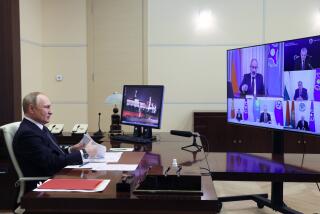Yeltsin OKs Visit to Japan; Shift on Kurils Issue Foreseen
- Share via
MOSCOW — In an announcement that astonished Tokyo, Russian President Boris N. Yeltsin said here Wednesday that he is willing to visit Japan in late May.
Prime Minister Kiichi Miyazawa immediately welcomed the proposal, which was delivered to him in Tokyo by Russian Foreign Minister Andrei V. Kozyrev. He asked Kozyrev to work out details with his Japanese counterpart, Kabun Muto.
The announcement indicated that Yeltsin sees the possibility of significant progress in breaking a 48-year political deadlock that has kept Russian-Japanese relations cool and Japanese aid to Russia relatively modest.
Special economic zones and joint projects already under way in the Russian Far East have been hindered by the inability of the two countries to agree on the fate of four islands seized by the Soviet Union after World War II. The islands are north of Japan’s northernmost main island of Hokkaido and at the southern end of the Kuril chain.
Although the Soviet Union and Japan restored diplomatic relations in 1956, the two nations never signed a peace treaty ending a seven-day period of hostilities when the Soviet Union declared war on Japan after the United States dropped an atomic bomb on Hiroshima in 1945. The Russian government inherited the diplomatic impasse with the breakup of the Soviet Union in 1991.
On Wednesday, Miyazawa announced that Japan will add $1.82 billion to its aid to Russia--bringing its total pledges to $4.6 billion. But Japan has insisted that only a resolution of the territorial dispute can open the door to full-scale assistance.
All of the aid that Japan has pledged so far has been given within a framework of international cooperation with other advanced countries, and often only after pressure from the United States.
Until now, the territorial conflict has appeared insoluble. Last September, Yeltsin canceled a scheduled trip to Japan four days before he was due to arrive when it became clear that a visit would bring no agreement.
Before the aborted visit, Japanese aid to Russia of up to $26 billion had been mentioned unofficially. If Russia and Japan can solve their differences, the potential for economic cooperation is tremendous. Russia’s Far East holds vast reserves of raw materials--from wood to gold--that could supply Japan’s industry. At the same time, the region could jump ahead by decades with Japanese technological assistance.
There had been no hint that Yeltsin had changed his view of the prospects for compromise until two days ago, when the Russian news agency Itar-Tass reported that he might be willing to visit before the annual Group of Seven advanced industrial nations’ economic summit in Tokyo in July.
On Wednesday, the Russian leader told a Kremlin news conference that “an opportunity has appeared to make an official visit to Japan since Japan’s prime minister, Mr. Miyazawa, unequivocally stated that the two issues will not be directly linked--that is, that of bilateral cooperation, economic cooperation and territorial issues.”
Miyazawa, in fact, has made no such statement--at least not in public. But Foreign Minister Muto said at a news conference Tuesday that Japan would treat “bilateral problems as bilateral problems, and aid to Russia as aid to Russia--superseding all other factors.” Muto added that Japan would continue to insist on the return of the islands.
Kozyrev initiated the subject of Yeltsin’s trip in what originally had been billed only as a “courtesy call” by declaring that Russia considers “a solution to the territorial dispute and normalization of diplomatic ties” with Japan to be “important.”
“Efforts to work toward those goals also are important,” a Japanese Foreign Ministry official quoted Kozyrev as telling Miyazawa.
But whether the territorial issue would be taken up during a Yeltsin visit “is one of the details to be hammered out by the two foreign ministers,” the Japanese official added.
Muto and Kozyrev, who is visiting Tokyo for a conference on aid to Russia, are to meet tonight.
Yeltsin said Kozyrev would set dates for his visit while the foreign minister is in Tokyo. Although Yeltsin mentioned a plan to visit in “late May,” Kozyrev told Miyazawa only that a visit in May is “one possibility.”
Shortly before Yeltsin enraged Miyazawa and other Japanese leaders by calling off his trip to Tokyo last September, Japan had offered to accept Soviet recognition of Japan’s ultimate sovereignty over the islands--and leave open the date for their future return. Yeltsin, however, declared that even that concession was unacceptable and blamed Japanese stubbornness for forcing him to back out of the planned visit.
Goldberg reported from Moscow and Jameson from Tokyo.
More to Read
Sign up for Essential California
The most important California stories and recommendations in your inbox every morning.
You may occasionally receive promotional content from the Los Angeles Times.










